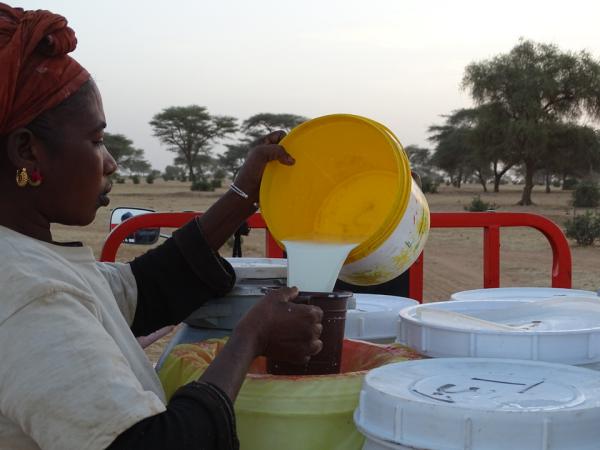To satisfy the food and economic requirements of growing rural and urban communities, conserve natural resources and adapt to climate change, we need to produce differently. Agroecology is one way of making that paradigm shift. It is a set of agricultural theories and practices that suggest alternative production systems inspired by how ecosystems function, aimed at conserving biodiversity and optimizing the links between crop farming, livestock farming, forestry, the environment, food systems and societies. Furthermore, agroecology and related professions provide solutions to government concerns in terms of employment and professional integration.
A context that calls for an agroecological transition
The population of Senegal, currently estimated at more than 16 million, is growing fast and looks set to top 25 million by 2035. Feeding those people sustainably, with healthy food, is a major challenge in the current difficult context: increasing climate change and urbanization, the negative environmental consequences of the "green revolution", the multiplication of health issues, largely as a result of changing food consumption patterns and of today's food systems, etc.
With the "PSE vert" initiative written into the national medium- and long-term economic and social growth plan (PSE), the Senegalese government clearly stated its ambition to support more sustainable production and food systems. Bolstered by this clear political will, various players in Senegal and elsewhere – including CIRAD – built an institutional framework in 2019 with a view to supporting the policy debate surrounding the agroecological transition. The framework, called DyTAES, associates farmers, consumer organizations, NGOs, local authorities, researchers and private firms. The aim is to fuel the debate, based on the experiences of its various members, with a view to sharing information and making certain recommendations.
Senegal is not starting from scratch on the road to the agroecological transition. Over more than four decades, initiatives supported by the State and civil society have resulted in positive field experiments and favourable regulatory instruments, plans and programmes. CIRAD has long worked in Senegal and has helped to sustain those initiatives, thanks to its substantial experience of agroecology in partnership with producers, researchers, development professionals and decisionmakers in many tropical and Mediterranean countries.
Mariam Sow, member of DyTAES says: "The time is now ripe for Senegal to spearhead the agroecological transition. The past few years have seen a range of initiatives centring on organic farming or farmer seeds, and they are becoming increasingly coordinated. There is a strong commitment on the part of local politicians and the national authorities. Senegal is also playing an active role in the coordination bodies in West Africa. As a research player, CIRAD has worked hard to produce scientific proof of the efficiency of agroecological systems, to help the State make a large-scale commitment. How can we move towards structuring action research at a community level, encompassing both endogenous practices and scientific knowledge? CIRAD has been involved in the discussions since DyTAES was launched, and also coordinated the drafting of the public policy support document. By returning to a situation of equality and mutual recognition on the part of fundamental science and farmer science, and by means of an integrated planning and funding system, DyTAES will really serve to structure operations on a territory scale, and to build production systems that will keep people on their land for years to come."
As a research player, CIRAD has worked hard to produce scientific proof of the efficiency of agroecological systems, to help the State make a large-scale commitment. How can we move towards structuring action research at a community level, encompassing both endogenous practices and scientific knowledge? CIRAD has been involved in the discussions since DyTAES was launched, and also coordinated the drafting of the public policy support document.
Mariam Sow
Executive Secretary, ENDA Pronat, and President, ENDA Tiers-Monde network, member of DyTAES
Helping to build ambitious public policies
In 2019, the members of DyTAES conducted a participatory assessment of the state of the agroecological transition in Senegal, involving more than a thousand players in six eco-geographical zones (Casamance, Niayes, eastern Senegal, groundnut basin, Ferlo, and the Senegal River Valley ). The assessment was coupled with an analysis of previous research work, and served to identify a series of major challenges for agriculture in Senegal, from resilience to climate change and pests and diseases to the need to promote family farming, through more sustainable management of natural resources such as water, soils and forests. In early 2020, following a series of meetings on agroecology organized by DyTAES and chaired by the Senegalese President, the movement handed the Minister of the Environment and Sustainable Development a report entitled "Contribution aux politiques nationales pour une transition agroécologique au Sénégal" (Contribution to national policy for an agroecological transition in Senegal). The report includes a diagnosis of the current situation of agriculture in Senegal, and makes a set of policy recommendations for the country's agroecological transition. Some twenty experts from structures belonging to DyTAES were involved in drafting the report, coordinated by CIRAD's Raphaël Belmin.
Other highlights have since followed in terms of building a framework for ongoing, multi-sector dialogue between DyTAES and the Senegalese government. The country's Minister of Agriculture, who met with DyTAES in November 2020, has decided to devote 10% of subsidies to organic fertilizers this coming winter. Since organic fertilizers are a lever for making farming systems more sustainable, that decision is a substantial step forward for the agroecological transition. Lastly, reflecting the growing international recognition of DyTAES, the movement was invited to speak at a plenary session of Heads of State at the One Planet Summit in January 2021. This provided an opportunity to encourage them to increase their commitment and remind them of the importance of adequate, coherent funding for agroecology.
DyTAES is an example for other agroecological movements worldwide. By going to meet rural people and subsequently analysing the results of their discussions, they were able to pinpoint the main determining factors for the adoption of agroecological practices as a way of promoting ecosystem services and food security and creating jobs. I'm convinced that DyTAES will serve as an example not just in West Africa, but throughout the countries along the Great Green Wall, and even in France. The partnership between DyTAES and CIRAD proves the merits of international collaboration for rolling out agroecological intensification in a way that is both scientifically measurable and accessible to farmers.
Sarah Toumi
Member of the French Presidential Council for Africa
Developing and coordinating local experiments
Alongside launching a dialogue with the authorities, DyTAES has also worked to structure its network, with formal struictures: a steering committee, technical committee and secretariat are responsible for steering and coordinating its activities. The movement has also drafted a charter of commitment and an action plan with five components. On the ground, backed by projects led by its members, DyTAES has produced scientific evidence of the contribution agroecology makes to more sustainable, productive systems. In return, all that work serves to fuel its advocacy and public policy support operations. The eventual aim is to build a network of interlinked local DyTAES on a municipality, county and territory level, to enable large-scale planning of the agroecological transition in the country. The first local DyTAES was launched on 24 March 2021 in the Tambacouda region, and others should emerge with the support of various projects currently being launched (Santés-Territoires, Fair Sahel, etc.).




























.jpg)